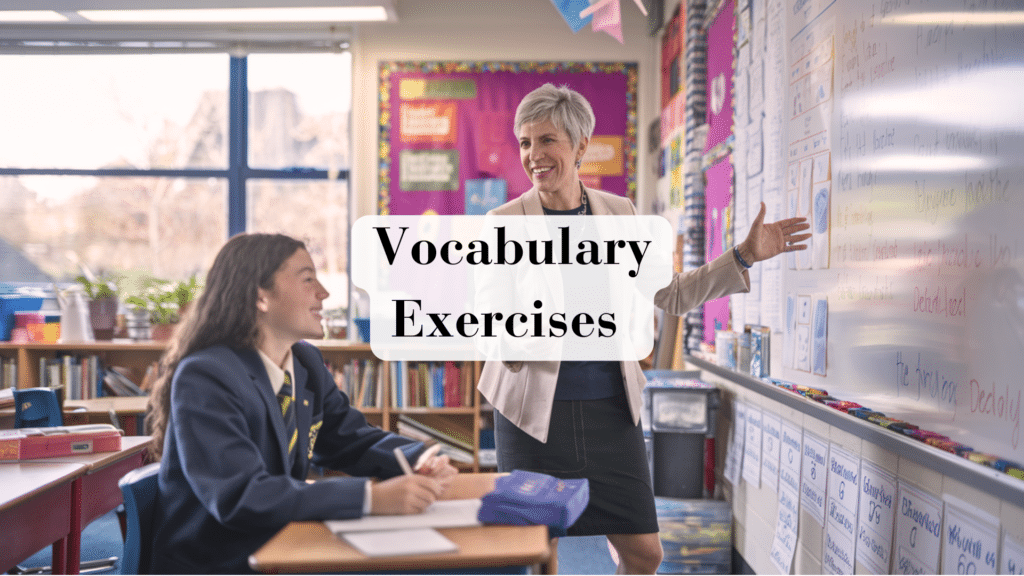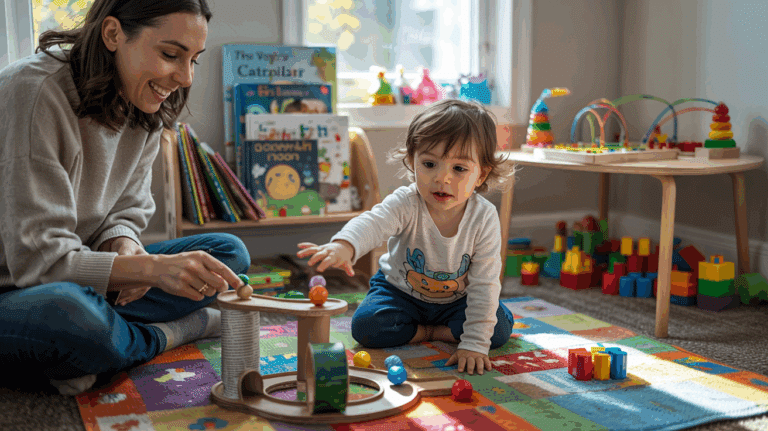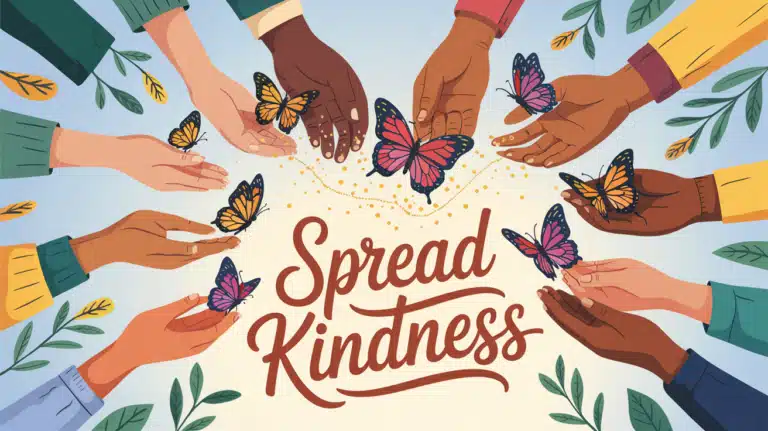A strong vocabulary is more than just knowing fancy words—it’s about expressing yourself clearly and confidently in any situation.
Whether you’re aiming to communicate better, improve your writing, or ace academic goals, building your vocabulary is a skill worth investing in.
Over the years, I’ve found that the best way to expand vocabulary is through engaging, consistent exercises.
In this blog, I’ll share practical and enjoyable vocabulary exercises that I personally recommend. These methods have helped me and many others improve comprehension, refine speaking skills, and elevate writing abilities.
From word games to simple daily habits, these exercises are easy to fit into your routine and deliver noticeable results.
If you’re ready to enhance your language skills and make learning new words fun, let’s get started. Trust me, you’ll see the benefits in no time!
Why Are Vocabulary Exercises Important?

Vocabulary exercises are essential for anyone looking to improve their language skills and boost confidence.
A strong vocabulary helps you communicate more clearly and effectively, whether in conversations, writing, or presentations.
It also enhances reading comprehension, allowing you to grasp complex ideas and enjoy what you read without stumbling over unfamiliar words.
Personally, I’ve found that a broader vocabulary makes writing much more engaging, as it gives you the ability to express ideas with precision and creativity.
My recommendation? Start small with daily word games or a “word of the day” habit. Gradually, you’ll notice how much more confident and articulate you feel.
Trust me, consistent practice in building your vocabulary is a game-changer that opens doors and makes every interaction more meaningful.
Learning new words might seem boring, but trust me – as someone who’s spent years helping people become better communicators, I’ve seen how the right vocabulary practice can transform your language skills.
1. Enhancing Communication Skills
I’ve noticed that people who regularly practice vocabulary exercises express their ideas more clearly. When you know just the right word, you don’t have to use five words to explain what you mean.
For example, instead of saying, “I feel really bad about what happened,” you can say, “I regret what happened.” It’s like having the perfect tool for every job – your conversations become smoother and more precise.
2. Improving Reading Comprehension
Something fascinating I’ve observed is that when you build your vocabulary through exercises, reading becomes much more enjoyable. You spend less time looking up words and more time understanding the actual message.
It’s like watching a movie without subtitles – you can focus on the story instead of trying to figure out what each word means.
In my experience, students who do regular vocabulary exercises start reading faster and understanding more complex texts within just a few months.
3. Expanding Writing Abilities
As a writer myself, I can tell you that a rich vocabulary is like having a bigger paintbox, you can create more vivid and engaging content.
When you practice vocabulary exercises, you learn not just new words but also how to use them effectively. I’ve seen blog posts transform from basic “good” and “nice” descriptions to compelling stories that keep readers hooked.
You’ll start catching yourself using varied expressions naturally, making your writing stand out.
4. Strengthening Confidence in Language Use
The best part about vocabulary exercises?
They build your confidence like nothing else. I remember how my own communication changed when I expanded my vocabulary and stopped second-guessing myself in professional emails or important conversations.
When you know you have the right words at your disposal, you speak and write more confidently. It’s like having a well-stocked kitchen – you know you can whip up whatever dish the situation calls for.
My top tip? Start with just five new words a week. Practice using them in sentences, try them out in conversations, and write them in your notes.
You’ll be amazed at how quickly these words become part of your natural language toolkit.
Remember, building vocabulary isn’t about using fancy words to sound smart – it’s about having the right word for the right moment.
In my years of teaching and writing, I’ve found that consistent, simple vocabulary exercises are often more effective than trying to memorize a dictionary.
Benefits of Vocabulary Exercises in Daily Life
Regular word practice offers many advantages that go beyond just knowing more terms. Let’s see how vocabulary exercises help in everyday situations:
1. Professional Growth
Better words open better doors – I’ve seen this happen repeatedly. One of my students landed her dream job after improving her technical vocabulary.
She practiced industry terms for 15 minutes daily, and within three months, she could explain complex concepts clearly in interviews.
During meetings, a strong vocabulary makes you sound more confident and competent. I noticed this myself when I started using precise words instead of vague ones.
Instead of saying, “the project went well,” I could explain exactly how it “exceeded expectations in efficiency and user satisfaction.”
2. Personal Communication
Clear words build stronger relationships. I watched a shy student become more outgoing simply because he could express his thoughts better.
He stopped feeling frustrated when explaining his ideas and started enjoying conversations more.
In my own life, a better vocabulary helped me resolve conflicts more easily. When I can precisely describe how I feel or what I need, misunderstandings happen less often.
Instead of getting angry, I can be “concerned” or “disappointed” – words that lead to better discussions.
3. Mental Sharpness
Your brain loves learning new words. I test this with my older students, who worry about staying mentally active.
Those who do regular vocabulary exercises report feeling more alert and quick-thinking. One 65-year-old student said learning five new words weekly keeps her mind “fresh and engaged.”
Problem-solving becomes easier, too. When you can name things precisely, you can think about them more clearly.
I noticed this while helping students with writing tasks – those with larger vocabularies found it easier to break down complex problems.
4. Reading and Learning Speed
A stronger vocabulary makes you a faster learner. I tracked my students’ reading speeds – those who worked on vocabulary could read 30% faster after three months because they didn’t stop to look up words as often.
What happened in my case? Were the books I once found difficult to read enjoyable? Technical documents that used to take hours now take minutes.
Why? Because I recognize more words instantly.
5. Cultural Understanding
Words are windows into different cultures. My international students who expand their English vocabulary don’t just learn new words.
They understand American culture better. They get jokes, catch references, and feel more connected to English-speaking communities.
I experienced this myself while learning Spanish. Each new word taught me something about Spanish-speaking cultures, making my travels richer and more meaningful.
6. Self-Confidence
What is the biggest change I see in my students? Confidence. When you know you can express yourself well, you speak up more often.
One student went from avoiding class discussions to leading them in just two months of consistent vocabulary practice.
Think about it, have you ever stayed quiet because you couldn’t find the right words? That stops happening when you build your vocabulary systematically.
Quick Tips from My Experience:
- Start with words you actually need in your daily life
- Learn whole phrases, not just single words
- Use new words in real situations within 24 hours
- Keep a list of words that helped you express yourself better
The best part? These benefits grow over time. Every word you learn makes the next one easier to remember. It’s like compound interest for your brain.
Want to get started? Pick one area where a better vocabulary would help you most. Focus on words for that situation first. What would you like to express better?
Remember, it’s not about using big words – it’s about finding the right words. Which benefit matters most to you?
Fun and Engaging Vocabulary Exercises
Learning new words doesn’t have to be boring. Try these enjoyable activities to build your vocabulary:
1. Crossword Puzzles and Word Searches
I start every morning with a quick crossword, and it’s incredible how it wakes up my brain. Puzzles do more than just teach you words.
They help your brain create strong connections that make remembering words easier. I’ve watched my students go from struggling with basic crosswords to tackling complex ones in just weeks.
Tip: Start with themed crosswords about topics you love. Love cooking? Try food-themed puzzles. They’re more fun, and the words stick better because they relate to your interests.
2. Synonym and Antonym Matching Games
This is my secret weapon for quickly building a rich vocabulary. Instead of learning words in isolation, match them with their synonyms and opposites.
I play a quick game with my students: I say a word, and they have 10 seconds to give me both a synonym and an antonym. It’s challenging but effective.
Here’s what works best: Pick a common word like “happy” and build a word family around it (joyful, content, sad, miserable). Use these words in sentences right away to make them stick.
3. Word of the Day Challenges
I’ve made this a daily habit, and it’s transformed my writing. Pick one new word each morning and challenge yourself to use it three times during the day.
I write my words on a sticky note and put it on my desk. By the end of the day, it feels natural to use it.
My favorite approach is to choose words you actually hear or read in real life, not random dictionary picks. They’re more relevant, and you’ll use them more often.
4. Fill-in-the-Blank Sentences
This exercise shows you how words work in real life. I create sentences with missing words for my students, but I don’t just give them one right answer – I ask them to try different words that could work. It helps them understand how context changes meaning.
Try this: Take a paragraph from your favorite book, remove some keywords, and try filling them in before checking the original. You’ll be surprised how many good alternatives you can find.
5. Flashcards for Quick Learning
I keep digital flashcards on my phone, and they’re perfect for those spare moments in line or on the bus. But here’s the trick – don’t just write the word and definition.
Add a personal example sentence and a picture. It makes the word stick in your memory better.
Tip: Use apps like Anki that space out your reviews based on how well you know each word. It’s like having a smart study partner.
The best part? These exercises don’t feel like studying. They’re more like word games that make you smarter.
I’ve seen students who thought they were “bad at vocabulary” become confident writers and speakers using these methods.
What vocabulary exercise sounds most interesting to you? Start with that one – enjoying the process is half the battle.
Digital Tools and Apps for Vocabulary Building
Technology offers many helpful tools for growing your word knowledge. Let’s see some useful and engaging options for vocabulary building.
1. Top Apps for Vocabulary Practice
Duolingo has been my daily companion for years, but not just for the obvious reasons. Beyond the basic lessons, I use its Stories feature to learn words in context.
The app tracks your weak spots and brings back words you’ve missed – exactly what our brains need for long-term memory.
Quizlet turned out to be more powerful than I expected. I create custom sets for specific topics, and their learning modes adapt to how well I know each word.
The spaced repetition system is fantastic – it shows you words right before you’re about to forget them.
My personal favorite discovery is Memrise. It uses videos of native speakers, which helps you learn not just the word but how it’s actually used in real conversations. I spend 15 minutes on it during my morning coffee.
2. Online Games and Quizzes
Vocabulary.com changed how I approach word learning. It turns vocabulary building into a game where you compete with others.
I’ve found myself actually looking forward to learning new words, especially when I’m close to beating someone’s score.
Freerice.com does something unique – you learn words while donating rice to people in need. Each correct answer equals 10 grains of rice donated.
I’ve made it part of my evening routine, combining learning with giving back.
Word Games Pro lets you play against real people. Nothing motivates you more than trying to outspell someone in another country. I usually play three rounds before bedtime.
3. Using Voice Assistants for Vocabulary Drills
Most people don’t think of this. I use Alexa for daily vocabulary practice. I ask for the “Word of the Day” and then makeup sentences using that word. The instant feedback helps with pronunciation, too.
Google Assistant has become my personal dictionary. When I read and find a new word, I ask it to use the word in different sentences. This gives me a better grasp of how the world works in various contexts.
Siri can help you practice vocabulary while driving. I created custom shortcuts for vocabulary quizzes that Siri reads out loud. It’s perfect for making use of commute time.
Quick Tips From My Experience:
- Pick one main app and stick with it for at least a month before adding others
- Set specific times for practice – I do vocabulary right after checking morning emails
- Use voice assistants while doing other tasks like cooking or cleaning
- Connect with other learners in-app communities – it keeps you motivated
The best part about these digital tools is that they track your progress automatically. You can actually see how your vocabulary grows over time. Nothing beats that feeling of looking back and seeing how far you’ve come.
Remember, consistency beats intensity. Ten minutes daily with these tools will give you better results than an hour once a week.
Vocabulary Exercises for Different Age Groups
Different age groups need different approaches to building word skills. Let’s see some specific exercises that work well for each group:
1. For Kids
Teaching kids vocabulary is like planting seeds – it needs to be fun and natural. I’ve seen incredible results using these methods in my elementary classes.
Rhyming games work like magic with young learners. When I teach words like “cat,” we make it a game to find words that rhyme – “hat,” “bat,” “rat.”
The kids don’t just learn new words; they discover how language sounds work. My students often make up silly rhyming stories, which helps them remember words better.
Picture-word matching turned into our class favorite. I create colorful cards with pictures on one side and words on the other.
Kids love the “memory match” version, where they turn over cards to find pairs. One of my 6-year-old students learned 20 new animal words in just one week using this game.
Fun stories with repetitive words stick wonderfully. I write short stories using new vocabulary words multiple times.
For example, a story about a “brave” knight who does “brave” things helps kids understand both the word and its usage. The excitement in their eyes when they recognize words in different contexts is priceless.
2. For Teens
Teenagers need exercises that feel relevant and challenging without being boring. These methods have proven most successful in my high school classes.
Sentence-building games get competitive and fun. I give students a new word and challenge them to create the most interesting sentence.
Recently, my students turned the word “procrastinate” into hilarious but meaningful sentences that they still remember weeks later.
Spelling bees with a twist works great. Instead of just spelling, teens must use the word in a sentence and explain its meaning.
This triple-threat approach helps them master words completely. One of my students went from struggling with writing to winning the school essay contest using this method.
Creative writing prompts using specific vocabulary words enhances teen creativity. I assign weekly stories that must include five new words.
The stories I get are amazing – from sci-fi adventures to high school dramas, all while properly using complex vocabulary.
3. For Adults
Adult learners need practical, efficient methods that fit into busy schedules. These exercises have helped my adult students see quick improvements.
Word association exercises connect new words to existing knowledge. I teach adults to create mind maps around new words, linking them to synonyms, antonyms, and related concepts.
A business professional in my class mastered 50 new words in a month using this technique.
Advanced word games challenge the mind effectively. We play “Word Chain,” where each person must use a word that starts with the last letter of the previous word, but all words must be from our vocabulary list. It’s challenging and engaging.
Book-based challenges work wonders for adult learners. I assign chapters from books in their field of interest and have them collect unknown words.
Then, create exercises around these words. An engineer in my class improved his technical writing significantly using this method.
Tips for Each Age Group:
- Kids: Keep it visual and active
- Teens: Make it relevant to their interests and social life
- Adults: Focus on practical application and efficient
How to Incorporate Vocabulary Exercises Into Daily Life?
Building a stronger vocabulary doesn’t require formal study sessions. You can blend word learning into your everyday activities with these simple methods:
1. Setting Goals for New Words Learned Weekly
Setting the right goals changed everything for me. I started with five new words per week – not fifty or a hundred.
This might seem small, but here’s why it works: you actually remember and use these words instead of forgetting them immediately.
My weekly routine looks like this:
- Monday: Choose five words from things I read or hear
- Tuesday to Friday: Use each word at least once per day
- Weekend: Review and play with the words in different contexts
The secret? I pick words I actually need. Last week, I learned “meticulous” because I kept wanting to describe my colleague’s detailed work style. Now, I use it naturally in conversations.
2. Reading and Identifying Unknown Words
I turn every reading session into a vocabulary opportunity. While reading my morning news, I underline words I’m unsure about.
But here’s the game-changer – I first guess their meaning from context before looking them up.
My personal method:
- Circle the unknown word
- Write my guess in the margin
- Look up the actual meaning
- Compare my guess with the definition
- Write a new sentence using the word
This method helped me learn 200 new words last year just from my regular reading habit. No extra study time is needed.
3. Practicing Conversations with Newly Learned Words
Using new words in real conversations is where the magic happens. I challenge myself to use new words during work meetings or casual chats.
Yes, it feels awkward at first, but it gets easier quickly.
Here’s what works for me:
- Practice the word in low-stakes situations first (like talking to my cat!)
- Use it in an email to a friend
- Try it out in a work presentation
- Share it with someone else who loves words
One of my students started a “Word of the Day” chat with her friends. They compete to use the day’s word in the most creative way. Their vocabulary grew, and they had fun doing it.
Quick Tips That Made a Huge Difference:
- Keep a notes app on your phone for new words you hear
- Set reminders to review words during daily idle moments (like waiting for coffee)
- Create personal examples that relate to your life
- Share your learning journey with others – it keeps you accountable
The best part? These habits take minimal extra time but give maximum results. I’ve seen busy professionals expand their vocabulary significantly just by tweaking their existing routines.
A Warning: Don’t try to learn too many words at once. It’s better to know five words well than fifty words vaguely. Focus on quality over quantity.
Tips for Maximizing Vocabulary Growth

1. Use Words in Context Regularly
Using words in real situations makes them stick. I learned this firsthand when teaching business English. Instead of memorizing lists, we started using new words in mock meetings and emails. The results were incredible.
Here’s what works best:
- Write new words in three different sentences about your life
- Use each word in a conversation within 24 hours
- Try the word in different situations (casual chat, formal email, writing)
My students who follow this method remember 80% of new words after a month, compared to just 20% with traditional memorization.
2. Learn Roots, Prefixes, and Suffixes
Understanding word parts is like having a decoder ring for language. When I learned that “bio” means life, words like biology, biography, and biodegradable suddenly made more sense.
My favorite word-building combinations:
- “pre” (before) + “view” = preview
- “anti” (against) + “social” = antisocial
- “re” (again) + “write” = rewrite
This knowledge helps you guess the meaning of new words accurately. One of my students figured out what “prehistoric” meant just by knowing “pre” means “before.”
3. Create Personalized Vocabulary Lists
Generic word lists don’t work as well as personal ones. I encourage my students to create lists based on their interests and needs.
A chef in my class made a list of food-related words, while a tech professional focused on software terminology.
My method for personal lists:
- Write down words you wish you knew while talking or writing
- Note words that others use that impressed you
- Collect terms specific to your field or hobby
- Add words from your favorite books or shows
These personal connections make words easier to remember and more likely to be used.
4. Engage in Group Learning Activities
Learning with others multiplies your success rate. I run a weekly word-sharing session where everyone brings one new word they discovered. It’s amazing how quickly we learn from each other.
Try these group activities:
- Start a word-of-the-day group chat
- Challenge friends to use new words in conversations
- Share interesting words you find in books or articles
- Practice explaining complex ideas using simple words
The key is making vocabulary growth a natural part of your daily life. My most successful students are those who turn learning into a habit rather than a task.
Conclusion
Improving your vocabulary is one of the most rewarding language skills to master. I’ve seen how consistent practice and the right exercises can transform how you express yourself and understand others.
The exercises I’ve shared are designed to be practical and fun, helping you stay motivated as you grow your vocabulary.
My personal tip? Pick one or two methods that excite you and make them a part of your daily routine. Small steps lead to big changes.
Do you have a favorite vocabulary-building trick? Or maybe a word game that keeps you hooked? Share your experiences—I’d love to know what works for you.
Let’s continue learning together and making language skills a strength.
Frequently Asked Questions
How long does it take to see improvements in vocabulary?
Most of my students notice changes within 2-3 weeks of daily practice.
One student started using new words confidently in meetings after just 10 days of focused learning. The key is consistency – even 15 minutes daily beats an hour once a week.
What if I keep forgetting the words I learn?
This happens when you don’t use the words enough. My solution?
Create personal examples and use each new word at least three times on the day you learn it. One student writes tweets using new words – she rarely forgets them now.
Should I learn words in isolation or in groups?
Learn related words, but not ones that are too similar together. Learning “happy” and “sad” together works well.
Learning “efficient,” “effective,” and “efficacious” at once leads to confusion, and I’ve tested this in multiple classes.
What about learning vocabulary for specific fields (business, technical, etc.)?
Start with the terms you hear most often in your field.
One of my tech students listed words from team meetings for a week and then focused on learning those specific terms. His work presentations improved significantly.


















